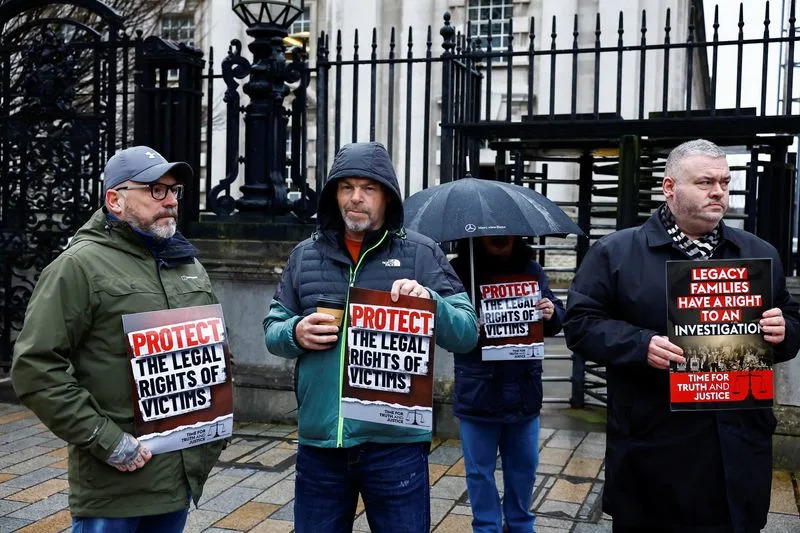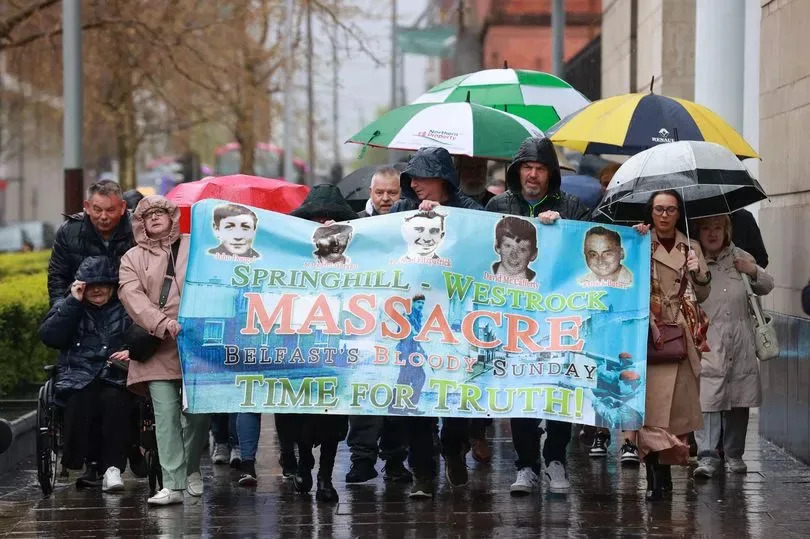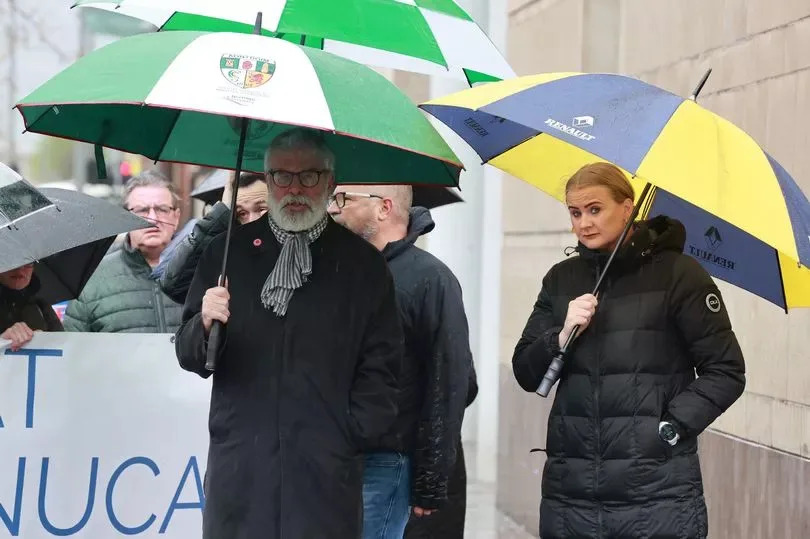New UK law ends 38 inquests into deaths during Northern Ireland's "Troubles"
Reuters
Wed, 1 May 2024

High Court judgment in landmark legal challenge to the UK government's Troubles Legacy Act, in Belfast
BELFAST (Reuters) - A total of 38 inquests involving the deaths of more than 70 people during Northern Ireland's "Troubles" will not go ahead after a disputed new British law came into effect on Wednesday, Northern Ireland's Chief Justice's office said.
Victims' families, human rights organisations and all major political parties in Northern Ireland - both British unionist and Irish nationalist - have condemned the law which proposed offering immunity from prosecution for those who cooperate fully with a new investigative body.
Belfast's High Court ruled in February that the offering of conditional amnesties to ex-soldiers and militants was in breach of the European Convention on Human Rights (ECHR), but it did not stop the new Independent Commission for Reconciliation and Information Recovery (ICRIR) body itself being set up.
Its establishment ended previous methods of examining how some of the 3,600 people died in three decades of confrontation between Irish nationalist militants seeking a united Ireland, pro-British "loyalist" paramilitaries and the British security services.
The conflict was largely ended with a 1998 peace deal.
Inquests that were halted included 14 that had already commenced but had not yet produced any findings, and some that were referred by the Attorney General as recently as Tuesday, hours before the cut-off.
The families of victims whose inquests have been stopped can request that the ICRIR body investigate the circumstances of the deaths under a different procedure.
Britain has defended the law, saying prosecutions linked to the events of up to 55 years ago were increasingly unlikely and it is also appealing the High Court's decision on the proposed amnesties.
Britain's Labour Party, clear favourites to win the next UK election due within months, has pledged to repeal and replace the legislation including restoring inquests and the option of civil cases.
The Irish government is mounting a separate legal challenge against Britain at the European Court Of Human Rights over the new law.
(Reporting by Amanda Ferguson, writing by Padraic Halpin; editing by Michael Holden)
N.Ireland 'Troubles' families defiant as UK amnesty law kicks in
AFP
Tue, 30 April 2024

More than 3,500 people in three decades of sectarian violence over British rule in Northern Ireland from the late 1960s (-)
When a coroner's inquest into the unsolved murder of Sean Brown during Northern Ireland's "Troubles" was relaunched last year, his family hoped their long search for justice could bear fruit.
But with a controversial new UK government law in force from Wednesday, their efforts -- and those of other families of victims in the bitter sectarian conflict over British rule -- have hit a roadblock.
The Northern Ireland Troubles (Legacy and Reconciliation) Act 2023 is designed to draw a line under the three decades of unrest, which killed more than 3,500 people, ministers say.
Notably, it will halt inquests, civil cases and criminal prosecutions for crimes related to the conflict and grant immunity to former combatants on all sides.
But relatives of those who lost their lives say it extinguishes any remaining hopes of justice for their loved ones.
Critics include victims' rights groups, all political parties in Northern Ireland, the UN and the EU's Council of Europe.
London has also been sued by the Irish government at the European Court of Human Rights in Strasbourg.
- 'Hiding secrets' -
According to the UK government, some 1,200 deaths from the Troubles, which ended in a landmark peace deal in 1998, remain under investigation.
In 1997 Sean Brown was abducted by pro-UK loyalist paramilitaries in Bellaghy, 50 miles (80 kilometres) west of Belfast while he was locking the gates of the Wolfe Tones Gaelic sports club.
The 61-year-old father-of-six, who was chairman of the club, was shot minutes later at a nearby village.
His body was later identified by his brother Chris.
"He was just an innocent guy and pillar of the community, he was taken out to intimidate that community," Chris Brown told AFP at the scene.
Decades later, the Brown family are still waiting for information about what actually happened.
Opponents of the new law say its essence is to protect British army and security force veterans who served in Northern Ireland, as well as paramilitaries.
Earlier this year the relaunched Brown inquest was told that more than 25 people, including state agents, were linked by intelligence material to his murder.
"We were completely gobsmacked when we heard that," said Brown's daughter Clare Loughran in the Wolfe Tones clubhouse.
"We had suspected some state involvement all along but to hear it read out in court, we were devastated. Why did so many people want to hurt my Dad?"
That limited release of information came after UK state agencies applied for multiple redactions on sensitive files related to the murder.
The coroner in the case branded the disclosure process by British state agencies as "deplorable and frankly inexcusable".
Niall Murphy, the Brown family's lawyer, showed AFP the released intelligence files at his Belfast office. Most of them were blanked out.
"Every single page, this is the physical method by which the state hides its secrets," said an exasperated Murphy, leafing through one of the dossiers.
"Even the material that is not completely redacted is so heavily redacted as to be completely incomprehensible, it deprives families of access to justice," he said.
The new law is "the act of legislative thugs, abhorrent to the international rule-of-law principle and in clear breach of the European Convention on Human Rights", he added.
- Little faith -
After May 1, all so-called legacy cases will be transferred to a new body -- the Independent Commission for Reconciliation and Information Recovery (ICRIR).
But families of victims have little faith.
"We don't feel that there will be a true, open and honest look at individual cases from the ICRIR, or that it will be something that families will want to comply with, as the British government for so long seem to have been hiding information and facts from families, from inquests, and from the public," said Loughran.
The main Labour opposition's Northern Ireland spokesman Hilary Benn also questioned the credibility of the ICRIR in the UK parliament last week.
According to the head of the ICRIR, the new body will prove doubters wrong.
It will strive to be "independent and impartial" and dedicated to the pursuit of "the unvarnished truth" for bereaved families, Declan Morgan told the Belfast Telegraph newspaper this week.
Loughran promised that her family would not give up chasing the truth, despite the closure of legal avenues.
"People will say, 'look, why don't you try to move on, the Troubles are over', but we can't, we will keep seeking justice, to respect the memory of victims," she said.
Heaton-Harris says UK-Irish relationship ‘strong enough’ to deal with legacy row
Cillian Sherlock, PA
Mon, 29 April 2024
The relationship between the UK and Ireland is “strong enough to deal with” a dispute over new legacy laws, the Secretary of State for Northern Ireland has said.
From Wednesday, responsibility for dealing with hundreds of unresolved cases will pass to a new truth recovery agency, the Independent Commission for Reconciliation and Information Recovery (ICRIR).
The Legacy Act includes a limited form of immunity from prosecution for Troubles-related offences to those who co-operate with the new body.

Tanaiste Micheal Martin (Yui Mok/PA)
The legislation has been opposed by all Northern Ireland political parties as well as victims’ organisations.
The Irish Government has also launched an interstate case against the UK at the European Court of Human Rights.
In addition, a judge at Belfast High Court ruled that the provision for conditional immunity was not compliant with the European Convention on Human Rights (ECHR). The UK Government is appealing against that finding.
Northern Ireland Secretary Chris Heaton-Harris discussed the row with Ireland’s deputy premier Micheal Martin at the British-Irish Intergovernmental Conference (BIIGC) in London on Monday.
Mr Martin said he “understands” the UK Government’s concerns about Ireland’s interstate case against new legacy laws.
He said the Irish Government took the decision to take the case “reluctantly”, and added: “Today I heard the British Government’s concerns about the case directly – I understand them.”
Speaking to reporters at the BIIGC, he said: “Equally, I hope that they understand our concerns and our sense of how we got to this point.
“My Government and every Irish government will always defend the central importance of the European Convention of Human Rights to the Good Friday Agreement – the ECHR is integral to the Good Friday Agreement.”
Mr Martin, who is the Irish foreign minister, said Ireland had a “desire to do right by the victims”.
Asked if the Irish Government would co-operate with the the ICRIR, he said Ireland was awaiting the outcome of legal challenges against the laws – which include its own interstate case.
He said: “We intend to have further meetings with victims’ groups in terms of where they see the situation now.
“Our ultimate objective is to do right by the victims and the families of the victims.
“As I meet more and more groups, there are younger generations coming through. So this isn’t going away, so to speak.
“Many of the younger generations of families are very determined to carry on the campaigns and to get resolution, so all of us – and we may have differences in approach – but I think all of us share a genuine desire to do right by the victims and the families of the victims.”
Mr Heaton-Harris told reporters that Ireland and the UK are “bound to” have various political debates.
He added: “But I’d like to think our relationship is strong enough to deal with all of those issues.”
However, the under-secretary of state for Northern Ireland said Ireland’s interstate case was “premature and unnecessary”.
Speaking at the same press conference, Lord Jonathan Caine also denied that the Legacy Act was a “cover-up” and said the ICRIC would provide answers “far more effectively and for many more people” than current mechanisms.
He added: “I would reject completely any suggestion that this is about cover-up because the new body will have access to far more state records than has ever been available to any such body in the past.

Chris Heaton-Harris and Micheal Martin with Lord Caine (Yui Mok/PA)
“What we are trying to do here is deliver as much information and as many answers as possible to those victims and survivors who actually want them and, of course, join this process.
“I’ve never shied away from the fact that there will be some things that emerge that are difficult for the UK Government and the British state.
“There’ll be things emerge which are very difficult for paramilitaries and former paramilitaries as well, but the intention behind this legislation is to allow victims to get more answers, more information against the backdrop where the current mechanisms work for a very small minority of people in Northern Ireland – and the chances this far on of successful criminal prosecutions is going to be vanishingly rare.”
The Northern Ireland Secretary also defended the establishment of the ICRIR as a move in “an important direction”.
Mr Heaton-Harris said the new body would have a “huge budget”.
Mr Martin told reporters there was discussion about a number of legacy issues including the Dublin-Monaghan bombings as well as the killings of Sean Brown and Pat Finucane.
He added that the Irish Government would fully co-operate with the UK’s Omagh bombing inquiry, amid calls for tandem public inquiries in both jurisdictions.
Seamus Dillon and Springhill inquests among hearings winding up ahead of deadline
David Young
Mon, 29 April 2024

Relatives of those was killed during the Springhill Westrock killings, outside the coroners court at Laganside in Belfast on Monday -Credit:Liam McBurney/PA Wire
Final hearings have been taking place in a series of legacy inquests in Northern Ireland as part of an intensive court schedule ahead of Wednesday’s legislative guillotine.
Coroner investigations into Troubles-related deaths must cease on May 1 under the terms of the Government’s contentious Legacy Act. Cases that are awaiting the delivery of findings, after all the evidence has been heard, can be brought to conclusion after the deadline.
On Monday, final submissions were heard in the inquests for five people killed in shootings involving the British Army in the Springhill/Westrock area of west Belfast in 1972.
Read more: Families of UVF victims outraged as Secretary of State blocks inquest finding
The inquest for Seamus Dillon, a doorman shot dead outside a nightclub in Dungannon in 1997, was wound up with the coroner expressing disappointment at the failure to finish the case before the deadline.
A hearing was also held on Monday for the series of inquests related to claims the RUC operated a shoot-to-kill policy in the early 1980s. The coroner is due to deliver remarks in that case on Tuesday.
Ahead of the deadline, several inquests have already been halted due to the extent of sensitive evidence that has been withheld from the cases.
The coroners in some of those instances have urged the Government to initiate public inquiries, so the material redacted as part of the Public Interest Immunity (PII) process can be properly examined.
In some cases, the Government has initiated legal action to prevent coroners providing summaries – or gists – of the matters subject to PII applications by the security forces.
Former republican prisoner Mr Dillon was gunned down by the Loyalist Volunteer Force (LVF) outside the Glengannon Hotel in Dungannon in 1997. The shooting was seen as a revenge attack following the murder of LVF leader Billy Wright in the Maze prison hours earlier.
In the final inquest hearing in the case, coroner Richard Greene said the inquest could not conclude due to a failure to complete the PII deliberation process.
A solicitor for the Dillon family accused the state parties of using the PII process to “run the clock down” ahead of the deadline – a claim denied by counsel for the state.
Mr Greene expressed regret that the inquest had not completed and stressed there remained a need for a human rights compliant probe into the death.
“It is of very great personal and professional disappointment that as corner I have been unable to complete this inquest,” he said.
“The death of Mr Dillon was a brutal and wholly unnecessary murder of a wholly innocent man who was going about his lawful work when he was shot by terrorists.”
Mr Dillon’s widow Martina, who was involved in a recent legal challenge that found aspects of the Legacy Act unlawful, said her fight for truth would continue.
Outside court, she said: “I feel a bit deflated but I intend to fight on. I’ll fight until I get the answers, until I get the truth and justice that my husband is entitled to.”
On Monday morning, families of those killed in the Springhill shootings walked together into court. Former Sinn Fein president Gerry Adams accompanied them.

Gerry Adams and Sinn Fein's Aisling Reilly outside the coroners court for the Springhill Westrock inquest -Credit:Liam McBurney/PA Wire
Natasha Butler, whose grandfather Paddy Butler was among those killed, said the Legacy Act was denying many families “truth, justice and accountability”.
“We pray for all the families who are getting…truth and justice ripped away,” she said.
Ms Butler added: “Truth and justice will not be denied to the Springhill/Westrock massacre families.”
No comments:
Post a Comment